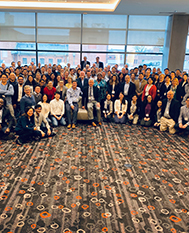Institute Hosts AMBIC December Conference, Unveils New Research
The Robert E. Fischell Institute for Biomedical Devices hosted the Advanced Mammalian Biomanufacturing Innovation Center’s (AMBIC) December 9-11 conference in College Park, MD. AMBIC is a multi-university center which develops emerging technologies, knowledge, design tools, and methods that apply and integrate high-throughput and genome-based technologies to fast-track advanced biomanufacturing processes. AMBIC brings together leading academic and industrial biotechnologists focused on mammalian cell culture manufacturing at a pre-competitive research level to address the complex problems in biopharmaceutical manufacturing. AMBIC Industrial Board members and other researchers convened to provide updates on current AMBIC projects, and present new project proposals. The conference attracted approximately 175 attendees, who also toured University of Maryland’s A. James Clark Hall, where the Fischell Department of Bioengineering (BIOE) and the Fischell Institute is housed. One of the December conference’s featured research projects was “Smart Marbles” – bioreactor pods (bPods), which are neutrally buoyant sterilizable microsystem sensor devices that could work within a bioreactor. The concept was developed by graduate student Justin Stine (ECE), Luke Beardslee, M.D., Ph.D., graduate students Chen-Yu Chen and Wu Shang (BIOE/Fischell Institute), Professor Reza Ghodssi (ECE/ISR/Fischell Institute), and Professor William Bentley (BIOE/Fischell Institute.) Their research is being funded by the National Science Foundation (NSF) and AMBIC. Bioreactors are vessels—typically cylindrical and made of stainless steel— in which a chemical process is carried out involving organisms or biochemically active substances derived from such organisms. They come in a variety of sizes and are used for fermentation, as in the beer industry, or to grow cells or cultures for tissue or biochemical engineering. Inside a bioreactor, dissolved oxygen, pH levels and temperature dramatically impact the quality and yields of products. The goal is to provide an optimal and constant environment so the products produced do not have varying patterns of oxidation, deamidation, glycosylation, charge, and so on. Such variations can influence efficacy and disqualify product lots. Currently, measurements are obtained from drawn samples that represent the reactor’s “average” concentration. Having multiple reporting probes inside the reactor could help companies improve their ability to more consistently produce uniform, viable batches. The need is especially great for sensing the vitally important level of dissolved oxygen. Maryland’s smart marbles are being designed with microsystems that can “eavesdrop on biology,” performing online dissolved oxygen sensing from inside the bioreactor, then wirelessly transmitting the data to an external user. Bentley and fellow Fischell Institute faculty member Gregory Payne also unveiled their recent research collaboration with Alan Stone Ph.D., professor of Environmental Health and Engineering and Michael Betenbaugh Ph.D., professor of Chemical and Biomolecular Engineering, of Johns Hopkins University, as well as Sarah Harcum (Ph.D. '93, Chemical Engineering), professor of bioengineering at Clemson University.
Related Articles: December 12, 2019 Prev Next |


